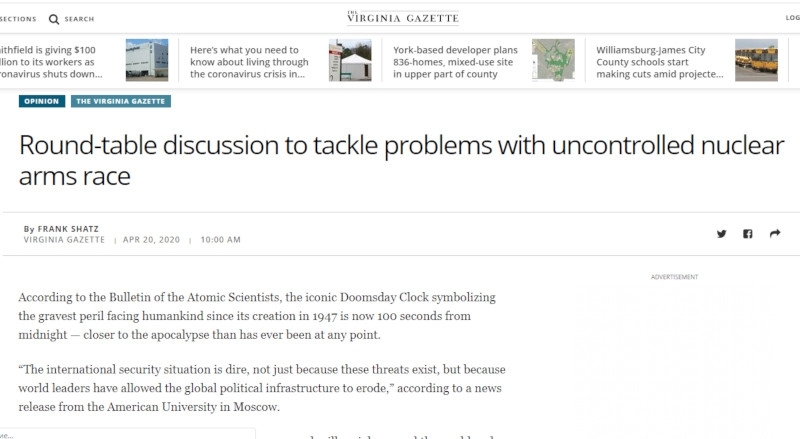
According to the Bulletin of the Atomic Scientists, the iconic Doomsday Clock symbolizing the gravest peril facing humankind since its creation in 1947 is now 100 seconds from midnight — closer to the apocalypse than has ever been at any point.
“The international security situation is dire, not just because these threats exist, but because world leaders have allowed the global political infrastructure to erode,” according to a news release from the American University in Moscow.
The International Committee of the Red Cross surveyed millennials around the world and learned that a majority of them believe it’s more likely than not that a nuclear attack will happen sometime in the next 10 years.
Are we predestined to experience a nuclear Holocaust? Not necessarily, asserts the news release from the American University in Moscow.
“April 25, 2020, marks the 75th anniversary of the momentous occasion when U.S. and Soviet forces met at the Elbe River, which signaled the approaching end of WWII. Today, the joyfulness created by the open display of soldiers’ comradery between East and West is needed more than ever. This celebration of this tremendously important historical event provides an excellent opportunity to engage in a long-awaited international dialogue because of the unprecedented tensions that threaten the security of the world. The reviving spirit of alliance born through the efforts of our predecessors will serve as an example and guide for today’s leaders.”
For many years, American and Russian veterans, as well as public organizations, have kept the spirit of that Elbe River meeting alive with commemorations and reunions and by erecting monuments in the two countries. This year, at the initiative of the American University in Moscow, and its founder and president, Dr. Edward Lozansky, who was instrumental in arranging an academic exchange with William & Mary, intended to bring the ceremony back to its starting point at the Elbe River where the reenactment of that historic moment was planned. Alas, the coronavirus crisis nixed the celebration. Instead, a virtual round-table discussion will take place about the lessons of WWII and how to resume U.S.-E.U.-Russia dialogue.
Among the numerous prominent participants at the Round Table will be Col. Gen. Valery Baranov, former deputy commander of Russian Internal Troops Academy; Gen. Kevin Ryan, former defense attache, U.S. Embassy in Moscow, Harvard Kennedy School Belfer Center for Science and International Affairs; Bruce Bean, professor emeritus Michigan State University; and dozens of other historians and scholars.
The round-table discussion’s aim, among others, is to emphasize the rising dangers and costs of an uncontrolled nuclear arms race. To stress the need for both bilateral negotiations between the United States and Russia and multilateral discussions among the permanent members of the United Nations Security Council. There is also an urgent need to address the problems stemming from the abandonment of the Intermediate-Range Nuclear Forces Treaty and the approaching expiration of the New START treaty.
[Top stories] Smithfield is giving $100 million to its workers as coronavirus shuts down plants »
“The world is racing towards a future of multi-polarity,” proclaims a statement issued by the American University in Moscow and other sponsors of the anniversary celebration. “Regional economic and military heavyweights will compete for influence in their respective spheres of interest, not unlike the European balance of power of the 19th century. In that context, the primordial question will be how to stabilize that system, while avoiding the cataclysm of war that in past proved to be the only means to settle questions of power. Christopher Clark has called this threat the problem of political ‘sleepwalkers’ stumbling into global war without intention but necessity due to the logic of the system that they build. To avoid the threat, not only a new foundation needed for global security but an architectural overhaul of that structure.”
The purpose of the round-table discussion, taking place on the 75th anniversary of the meeting of U.S. and Soviet forces at the Elbe River during World War II, is to find solutions to this problem.
By Frank Shatz
Read also: International teleconference to the 75th Anniversary of the Meeting on the Elbe


